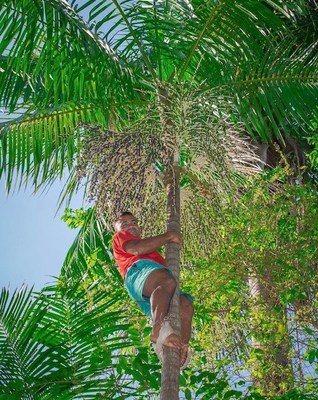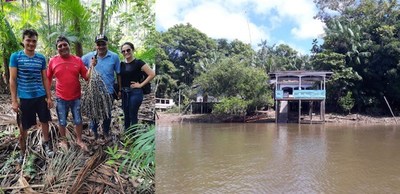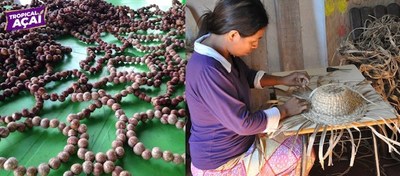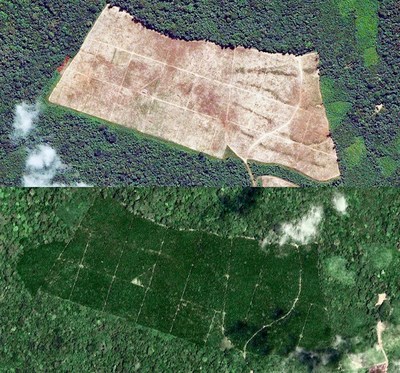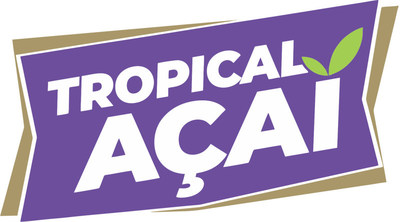|
18.01.2022 17:09:00
|
Lessons from the Amazon: How Sustainability Plays a Big Role in Tropical Açaí's Success
POMPANO BEACH, Fla., Jan. 18, 2022 /PRNewswire/ -- On a warm humid day in Pará in the northern region of Brazil, a Ribeirinho deftly scales an açaí palm. Arms wrapped around the trunk, shoes digging in the bark, he pushes himself up the tree to collect hoards of small fruit about the size of blueberries as the tide that provides natural irrigation and fertilization slowly rises.
Tropical Açaí, a vertically integrated acai supplier, cares for the environment, its employees, and its community.He gathers the berries in a basket made from the leaves and stems of the açaí tree, to be transported by riverboat to a small family farm in the city of Inhangapi. Here they'll be crushed, pitted, and pulped in a processing facility powered by biofuel produced using the seeds of the açaí.
This Amazon local, an indiginous native, will receive a percentage of the berries he harvests along with his wage. In this small city where the profitability of the açaí industry has increased exponentially in the last two decades, both the locals and government have benefitted from new community gardens, raised standards of living, and increased biodiversity. During a time when sustainability is marketable and greenwashing is common practice, Tropical Açaí does the good work for the best reason: because they care.
Açaí (pronounced as ah-sigh-EE) has exploded in popularity in the US in the last ten years. Much more than just a trendy health food boasting of Omega-6, lipids, anthocyanins, amino acids, calcium, proteins, and antioxidants, açaí fruit has been a regional diet staple of the indigenous floodplain tribes since before recorded history. Brazilian folklore tells of the Amazon being born from a single seed of açaí.
Açaí is a filling, savory, and ubiquitous dish valued by all local families in northern Brazil; no meal is considered complete without it. The fact that it is a savory dish may come as a surprise to many Americans who have only enjoyed the sweetened açaí puree in the form of a smoothie or fruit bowl. A superfruit rich in antioxidants and amino acids, açaí has been especially essential to Ribeirinho communities, or traditional river people. These indigenous natives have been harvesting and preparing açaí using the same technique they've used for centuries: scaling trees, retrieving the berries, and pulling off the fruit.
Any industry can develop labor and supply chain issues, but with the proper employers, growing, harvesting, and transporting açaí can be a profitable occupation for the rural indiginous population. Tropical Açaí is one of those employers.
Tropical Açaí
Tropical Açaí is a vertically integrated company that controls all steps of its farming, supply, production, manufacturing, and exportation. Their açaí is Certified USDA and IBD Organic, Non-GMO, Non-Dairy, Vegan, Certified Kosher, and holds the FSSC 22000 Food Safety Certification, a globally recognized standard that addresses food safety and quality. Their farm, located in Inhangapi, Pará in the northern region of Brazil, is an integral part of the local economy. The farm that exclusively supplies Tropical Açaí is a family farm, producing açaí pulp for more than 16 years and run by third generation farmers, growers, producers, and exporters. The farm has a close relationship with the regional population, providing excellent opportunities to the local Ribeirinhos that extend far beyond employment.
Ribeirinho harvesters keep a percentage of the berries they harvest. Farm workers make jewelry from açaí seeds, and these bracelets and necklaces are sold in the US for non-profit. 100% of the proceeds are given to the crafters in Brazil. As the top priority for covid vaccines due to their weaker immune system, indigenous Ribeirinhos working for Tropical Açaí were encouraged to get vaccinated and given pay days for any days they spent sick. During the covid pandemic, locals were given meal kits: whole meals and essential ingredients to offset the cost of groceries.
The company hosts presentations, seminars, and training on topics from organic farming and ecology to health and hygiene, even providing trips to seminars in large cities such as Sao Paulo. Safety training regarding tree climbing as well as quality assurance are necessities. Local government funds generated by the taxes paid from açaí sales have been allocated towards a community garden and teaching centers to provide education on how to properly cultivate açaí in the amazon estuary, made possible with company donations of açaí nursery trees.
Tropical Açaí supports all pillars of sustainability (environmental, social, and economic) through their integrated business practices and cares for the environment in addition to their employees and community. They've taken remarkable steps to make their processing facility have little to no negative effect on the Amazon rainforest while promoting local reforestation, development, and diversity.
Environment and Biodiversity
The land that the farm that supplies Tropical Açaí bought was previously deforested and partially served as a farm for black pepper, a non-native plant that required energy-intensive irrigation methods. The monoculture of black pepper damaged the soil and altered the natural biodiversity that existed. Monoculture as an agricultural process leads to a decrease in species richness, which leads to a decreased crop yield due to lack of pollinators and biological pest controllers and a dangerous cycle of attempting to boost yield with artificial fertilizers and pesticides. Black pepper is not the only devastating monoculture crop in this region. Cattle ranching and soy cultivation, as well as gold mining and logging, all lend a hand in the Amazon's destruction. Deforestation has continued to surge in Pará in recent years, reaching a 12-year high.
The farm replanted açaí trees (Euterpe oleracea) and returned to natural and traditional agricultural systems. The açaí grown on the farm is native to the floodplains of the Amazon region and is irrigated naturally by the tides and rains. The Tocantins River floods the area twice a day. The floodwaters carry soils and help cycle nutrients, providing a flush of nutrients that act as a natural fertilizer for the plants. Pará gets around 100 inches of rain annually that supplement the irrigation provided by the tides, helping the açaí flourish.
The palms also get extra fertilizer from the palm leaves left on the ground during trimming. When a palm is overgrown, the plant is pruned for vitalization and new branches grow in place of the old. The old palm branches are harvested for the heart of palm, or palmito, they contain inside, a hearty fibrous vegetable enjoyed by locals, while the palm leaves are left to decompose. Using these traditional harvesting, irrigation, and fertilization techniques has revitalized natural biodiversity in the area. No pesticides are necessary for the farm that supplies Tropical Açaí because pest controllers and insects have returned, and the bee population in the area has surged once again. Other native trees now grow within the farm too, promoting reforestation and improving harvest.
Despite being a native Amazon plant, açaí is now grown as a monoculture by large corporations using industrial irrigation systems, pesticides, GMOs, and nitrogen-infused fertilizers due to growing demand for the fruit from the US. This not only disrupts the natural biodiversity of the area but interrupts the delivery of the nutrient-rich soil (which provides açaí with some of its superfood characteristics) and results in lower quality açaí. When açaí farms grow patches of açaí trees surrounded by forests, those plants produce more fruit per clump than the açaí trees planted in monoculture farms.
Tropical Açaí uses a high quality manufacturing process, meaning there is no pulp and water separation. Recently the company started using the açaí seeds as a source of biofuel, providing energy for their processing machines. Prior to this implementation, they sold the seeds to be used for biofuel for a nearby mud roofing company from the beginning of their operations, and still sell their surplus seeds to this facility. The seeds are also used to make jewelry, and the leaves and stems of the açaí are used for making rafters of roofs and building materials, as well as hats, brooms, and baskets.
Brazil produces over a million metric tonnes of açaí fruit puree per year, yet it's estimated that most of the açaí eaten in the US has been produced in an unsustainable way. According to a study that came out this year, indigenous territories and protected lands in Brazil act as important carbon sinks. Açaí production can be done in a way that benefits the community (including indigenous peoples such as the Ribeirinhos), the land, and the company. But these social, economic, and environmental benefits don't hold true for many larger açaí companies employing agroindustrial practices. Tropical Açaí values traditional açaí production techniques carried out in harmony with the sacred surrounding Amazon rainforest.
Oftentimes in the US, we don't know where food comes from, how it's made, or who worked to get it from farm to plate. When it comes to marketing açaí as a health food, many companies can claim to be traditional and natural while maintaining a berry supply from monoculture farms that harm the environment. According to Renata Prates, CEO of Tropical Açaí, the company's focus is "to not only provide the best açaí to the USA but to also give back to our Brazilian community with social and economic responsibilities and give back to the land that provides us with this amazing açaí palm by being eco-conscious." You can be confident when buying from Tropical Açaí that you are choosing to support a company that cares for their employees, their community, and the world.
Tropical Acai contact sales@tropicalacai.com
Phone 855 550 2224
![]() View original content to download multimedia:https://www.prnewswire.com/news-releases/lessons-from-the-amazon-how-sustainability-plays-a-big-role-in-tropical-acais-success-301460959.html
View original content to download multimedia:https://www.prnewswire.com/news-releases/lessons-from-the-amazon-how-sustainability-plays-a-big-role-in-tropical-acais-success-301460959.html
SOURCE tropical acai
 Der finanzen.at Ratgeber für Aktien!
Der finanzen.at Ratgeber für Aktien!
Wenn Sie mehr über das Thema Aktien erfahren wollen, finden Sie in unserem Ratgeber viele interessante Artikel dazu!
Jetzt informieren!
